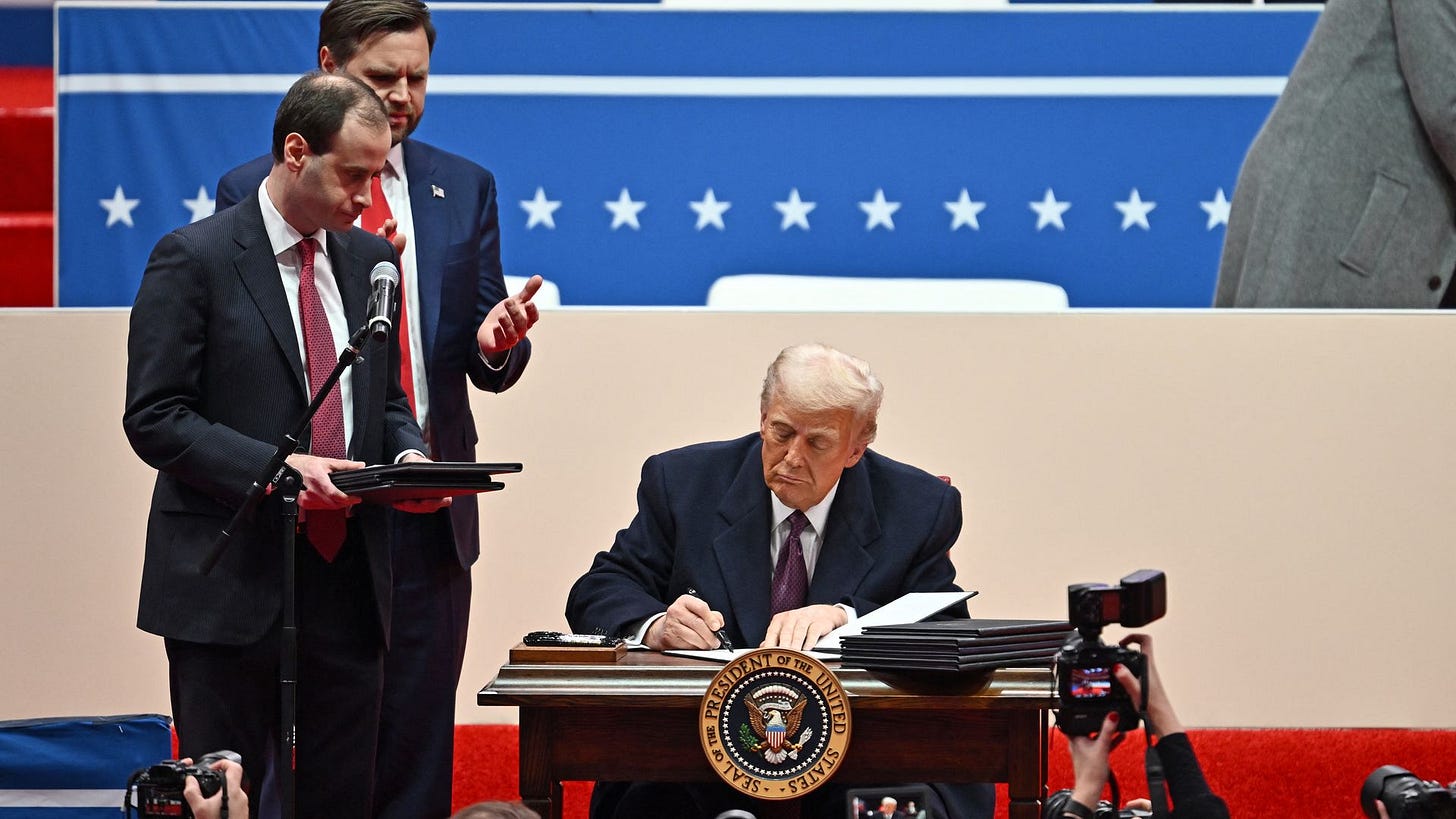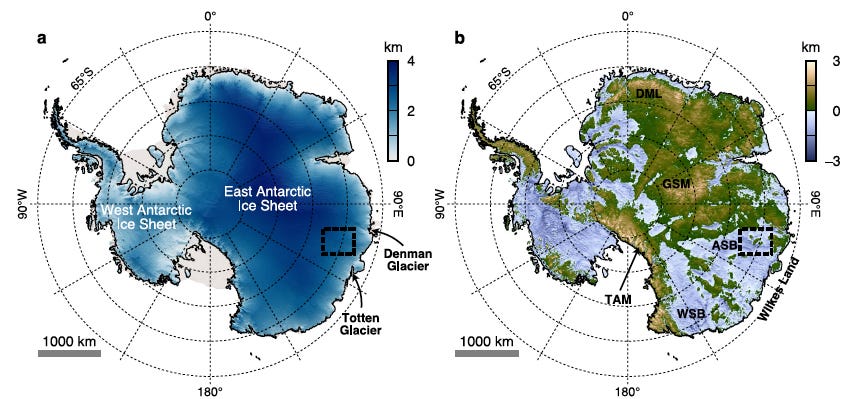Good morning, It’s Tuesday, January 21st. In today’s news, Trump targets February 1st for 25% tariffs on Canada, Biden issues preemptive pardons for Fauci, Milley and January 6th committee, Trump hits the ground running with significant executive actions on day one, Environment Minister Guilbeault admits the Carbon Tax could be replaced, and much more.
First time reading the daily blend? Sign up here.
Trump Eyes February 1st Start for 25% Tariffs on Mexico and Canada
Former President Donald Trump has announced plans to impose 25% tariffs on imports from Mexico and Canada starting February 1. Trump cited concerns over both countries allowing the flow of migrants and fentanyl into the United States. “We are thinking in terms of 25% on Mexico and Canada because they’re allowing vast numbers of people…to come in, and fentanyl to come in,” Trump said during the signing of executive orders. He added, “I think we’ll do it Feb. 1,” when asked about the timeline.
This follows a pledge Trump made during his 2024 campaign, where he threatened a similar tariff against Mexico unless its government curbed migration at the southern border. The scope has since expanded to include Canada and China, aligning with Trump’s broader strategy to leverage tariffs as a tool for addressing economic and security concerns.
During his first term, Trump’s tariff policies rattled financial markets and strained relationships with key trading partners. While he claims tariffs will bring financial benefits to the U.S., critics argue they effectively act as a tax on consumers by increasing the cost of imported goods. Experts warn that such measures could provoke retaliation from trading partners and disrupt industries reliant on cross-border trade.
With Mexico and Canada being the top trade partners for the U.S., this move could have wide-reaching economic consequences. As February 1 approaches, questions remain about whether these tariffs will effectively address Trump’s concerns or lead to unintended economic fallout. Source.
Biden Issues Preemptive Pardons for Fauci, Milley and January 6th Committee
In a dramatic final act as president, Joe Biden issued preemptive pardons to Dr. Anthony Fauci, retired Gen. Mark Milley, and members of the January 6th House Select Committee, including former Rep. Liz Cheney, as well as law enforcement officers who testified before the panel. The move, announced just hours before Donald Trump’s swearing-in for his second term, has sparked fierce criticism from Republicans, who argue that Biden’s actions are a thinly veiled attempt to shield political allies from accountability.
Biden defended the pardons as a safeguard against “politically motivated prosecutions,” stating that the individuals in question were public servants who didn’t deserve to face legal action. However, many view these pardons as an implicit acknowledgment that the Democratic administration knew these figures were instrumental in advancing partisan agendas. Milley, for instance, has faced backlash for unauthorized communications with a Chinese general, raising questions about loyalty and protocol. Similarly, Fauci has faced accusations of misleading Congress about virology research and possibly sharing some responsibility for the pandemic. At the same time, the January 6th committee has come under fire for alleged mishandling and deletion of key records.
The pardons paint a picture of an administration circling the wagons to protect its operatives. Critics have called the recipients “henchmen” for their roles in what they describe as politically motivated investigations and policies designed to undermine Trump and his allies. Republicans have slammed the decision, with Rep. Andrew Clyde (R-Ga.) calling it an attempt to "cover up Democrats’ trail of criminal activity.”
Biden’s parting words—that the pardons should not be seen as evidence of guilt—are unlikely to sway detractors who see this move as the ultimate political shield. For Biden and the Democrats, it appears the risk of leaving their loyal operatives exposed to Trump’s incoming administration outweighed the optics of a controversial last-minute pardon spree.
Trump Hits the Ground Running: Day One of Executive Actions Signals Sweeping Policy
President Donald Trump wasted no time implementing his “America First” agenda on his first day back in office, signing an unprecedented 200 executive actions, memoranda, and proclamations. These orders mark the most aggressive policy shift in modern U.S. history, aimed at undoing Biden-era mandates and enacting sweeping changes across the federal government.
Addressing January 6th Cases
In a bold move, Trump granted full pardons to approximately 1,500 individuals involved in the January 6, 2021, Capitol protests. Some high-profile cases, including former Proud Boys leader Enrique Tarrio’s, received clemency, signalling a controversial stance on revisiting these convictions.
Overhauling Federal Agencies
Trump immediately tackled federal bureaucracy. Orders included a freeze on federal hiring (excluding the military) and a directive mandating a full return to in-person work for government employees. He also initiated a review to combat inflation, restore freedom of speech, and prevent government censorship. Another key directive ended what he described as the Biden administration’s “weaponization of government” against political opponents.
Immigration and Border Policy
Immigration saw some of the most sweeping reforms. Trump declared a national emergency at the southern border, reinstating wall construction and directing military resources to enforce border security. Policies ending birthright citizenship for children of illegal immigrants and suspending refugee admissions were also signed. Additionally, cartels and gangs were designated as terrorist organizations, with the Justice Department instructed to pursue capital punishment for immigrants committing heinous crimes.
Economic and Energy Priorities
In his economic directives, Trump declared a national energy emergency, rolling back Biden’s electric vehicle mandates and prioritizing energy independence by promoting natural resource excavation, particularly in Alaska. He also withdrew the U.S. from the Paris Climate Agreement and the World Health Organization, citing these organizations as “unfair” and “one-sided.”
Gender and Diversity Initiatives
Trump abolished diversity, equity, and inclusion (DEI) programs, redefining gender policies to recognize only two sexes based on reproductive function. He also ordered reviews of renamed facilities tied to DEI initiatives.
Trump’s actions signal a decisive shift from Biden-era policies and the beginning of a transformative term prioritizing security, energy, and American sovereignty. Source.
Guilbeault, the Carbon Tax's Staunchest Defender, Admits it Could be 'Replaced'
Federal Environment Minister Steven Guilbeault, a staunch defender of the consumer carbon tax, acknowledged its growing unpopularity and hinted it could be replaced. Guilbeault emphasized the government’s broader climate strategy, which includes 100 measures, and noted industrial carbon pricing achieves three times the emissions reductions of the consumer tax. Meanwhile, Liberal leadership contenders Chrystia Freeland, Mark Carney, and Karina Gould have expressed openness to scrapping the tax. Guilbeault blamed Conservative Leader Pierre Poilievre for the tax's unpopularity, accusing him of spreading misinformation, while Conservatives criticized the Liberals for increasing costs for Canadians. More
As WEF Gets Underway, the List of World Leaders Not Attending Davos Speaks Volumes
The 2025 World Economic Forum (WEF) in Davos, Switzerland, got underway today and runs through January 23rd. While it will host around 3,000 leaders from over 130 countries, notable absences include leaders like Indian Prime Minister Narendra Modi, Chinese President Xi Jinping, French President Emmanuel Macron, Italy’s leader Giorgia Meloni and British Prime Minister Keir Starmer. Of the Group of Seven (G7) industrialized nations — which includes the US, Europe’s biggest economies, Canada and Japan — the only head of state attending the summit in person is outgoing German Chancellor Olaf Scholz.
While some key global leaders will attend, such as Ukrainian President Volodymyr Zelenskyy and South African President Cyril Ramaphosa, many heads of state are sidestepping the event due to domestic issues or skepticism about its elitist reputation. The forum's theme is "Collaboration for the Intelligent Age," focusing on global issues like economic fragmentation, climate change, and technological transformation. More
Southern States Declare Emergencies Ahead of ‘Once-in-a-Generation’ Storm, as Cold Temps Chill 220 Million People - More
Houthis to End Red Sea Attacks, Except Against Israeli Ships - More
'Lack of Understanding of Modern Warfare' — Seoul Reports 3,000 North Korean Casualties in Russia's Kursk Oblast - More
Pope Dissolves Peru-based Catholic Movement After ‘Sadistic Abuses’ - More
Loblaw Says Grocery Price Growth to Remain High in its Own Inflation Report
Loblaw warns that grocery prices will continue to rise faster than overall inflation due to a mix of factors, including a weak loonie, supply chain issues, and rising production costs. The company highlighted significant price increases in commodities like coffee, cocoa, and beef. While overall inflation dropped to 1.9% in November, grocery prices rose by 2.6%. Loblaw, facing scrutiny from both politicians and consumers, denies profiting from inflation, blaming suppliers for high price hikes. Despite easing in some areas like olive oil, food prices are expected to keep climbing faster than general inflation. More
Canada’s Immigration Department Cutting 3,300 Jobs, Prompting Concerns Over Backlogs and Processing Times - More
BMO Poll: More Than Half of Canadians Are Concerned About a Recession - More
I would argue we’re already there.
Researchers Uncover Prehistoric Landscape Buried Beneath Antarctica
Researchers have uncovered a hidden landscape beneath the East Antarctic Ice Sheet, revealing ancient river networks and lush vegetation that date back over 34 million years. Using advanced satellite imaging and geophysical surveys, scientists discovered mountain ranges, canyons, and lakes buried under nearly two kilometres of ice. This landscape, once part of the supercontinent Gondwana, provides critical insights into Antarctica's past climate and the ice sheet's evolution. More
Scientists Confirm Ancient Biblical Battles Using Groundbreaking Magnetic Dating Technique - More
Blue Jays Sign Anthony Santander—A Costly Consolation Prize
The Blue Jays signed outfielder Anthony Santander to a five-year, $92 million contract, which includes player options and deferred money. While the deal arguably boosts the team by 2-3 wins, it is seen as a risky long-term commitment, given Santander's age and below-average defence. Coming off a career year, Santander provides much-needed power, but his aging profile and poor defensive skills raise concerns about the deal's future value. The Blue Jays hope this move will strengthen their offence, though questions remain about its long-term effectiveness. More
Ryan Garcia Draws 'Rolly' Romero for May Return Fight; Devin Haney vs. Jose Ramirez on Undercard - More
Josh Gad Says He Was Denied a Role in ‘Avatar’ Because He Looked Like a ‘Tall Overweight Smurf’ As a Na’vi - More
Trudeau Snubbed: Not Invited to Trump’s Inauguration
Bob Dylan’s Draft of Lyrics, Once Tossed in Trash, Sells for $500,000
On This Day in 1793 Louis XVI of France is executed by guillotine in Paris, following his conviction for "high treason" by the newly created French Parliament (Convention nationale), during the French Revolution


















